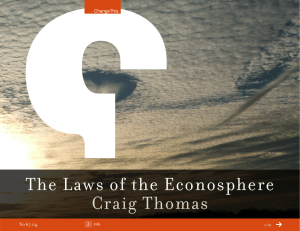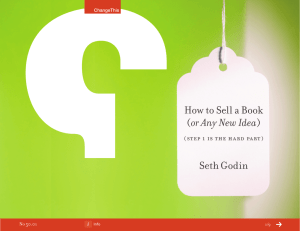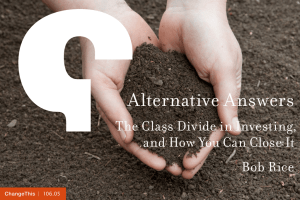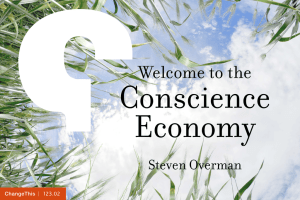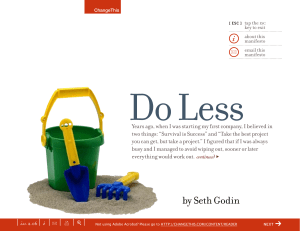Economic Integrity and What That Means for
advertisement
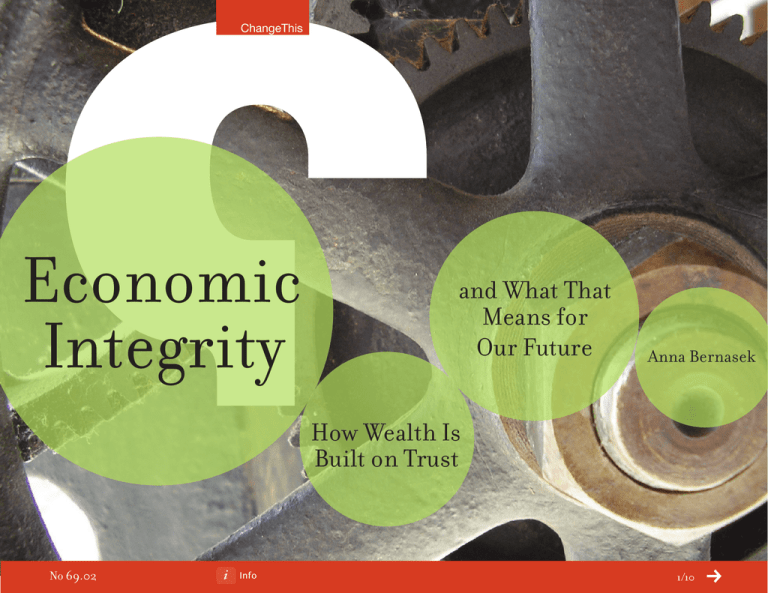
ChangeThis Economic Integrity and What That Means for Our Future Anna Bernasek How Wealth Is Built on Trust No 69.02 Info 1/10 ChangeThis Why Integrity? For too long, the economics profession has minimized the critical role of cooperation in economic activity. Emphasis on the individual has risen above all else and overshadowed the profound ways we depend on each other. You may have heard a successful businessperson boast, “I did it all myself.” I want to interrupt at that point. Every successful business requires the cooperative effort of many people—the banker who believes in the business plan, the customer who trusts the product, the employee who devotes precious time to the business and its owners. If we ignore the important ways people cooperate to create wealth, we miss the most valuable source of wealth creation imaginable. Recognizing the true value of relationships, we can build stronger relationships and create and share greater wealth. It’s a powerful way to reinvigorate the economy. In this era, when so much seems to be going wrong, many have lost trust in their fellow citizens. But the path forward can’t be to stop trusting. We need to build the trust that will power the economy for decades to come. The economy isn’t some dirty game where all the players are only out for themselves, trying to make their names and their fortunes. It’s a noble project. Each one of us has a meaningful role to play. In the end, what you do really does matter. By appreciating integrity as an asset that is valuable, companies can learn how to invest in it and create wealth. Knowing the techniques for investing in integrity, brands, feedback, and communications, among other things, we can build sustainable and valuable businesses. All too frequently we are given the false choice between free markets or regulation. It’s a pointless debate that has disturbed me for some time. We need to bridge the gap between left and right and provide a fundamental approach. Understanding integrity will let us have an honest debate about how to make our system better. No 69.02 Info 2/10 ChangeThis When Economics Lacks Integrity The financial crisis of 2008 was first and foremost a crisis of integrity. The seeds were sown as great numbers of people sought their own short-term advantage, knowing that they were putting others at risk. In short, it happened like this: Homeowners took out mortgages that they knew were likely to prove unaffordable later on. Banks lent money knowing it was unlikely to be repaid. Wall Street operators bought the junk mortgages and resold them in the guise of sound investments. Accountants, lawyers, and ratings agencies collected hefty fees for misleading assurances. And investors giddily chased outlandish returns, unconcerned by the all too apparent risks. In the climate of greed, frauds great and small multiplied and spread like potent germs in a warm petri dish. The whole vast and intricate financial universe, with all its sober rules and gray-haired regulators, had been diabolically converted by the nation’s brightest minds into a casino where gamblers were risking mountainous piles of other people’s money. Before the chips fell, those gamblers claimed a lion’s share of false winnings and absconded with fortunes intact, leaving behind a generation’s worth of toxic residue for the eventual contemplation of investing clients and the taxpaying public. Formerly prudent and conservative financial institutions, mighty insurance companies and banks, used loopholes in rules to turn themselves into freewheeling risk takers and in the process ran their firms off the road. Bad strategy and risk taking at the top infected entire institutions and overwhelmed the hard work and diligence of thousands of individual employees. And all the while the true financial state of those institutions was obscured. Banks via reports and balance sheets said over and over that they were solvent, only to reveal later that they actually weren’t. In the end, those in charge compromised the integrity of their institutions and ultimately the integrity of the entire financial system. And they did it while those experts trusted to supervise the system looked the other way. No 69.02 Info 3/10 ChangeThis As soon as investors began questioning the integrity of individual institutions, the financial crisis erupted with a devastating fury. One major bank after another came forward to reveal breathtaking losses, and trust began to unravel. Players who had never questioned each other’s integrity did so. Suddenly no one trusted anyone enough to do business with them, and credit markets stopped working. Policy makers and government institutions tried to call on the enormous credibility they had built in the past but instead looked panicked and uncertain. One government initiative after another failed to quell the fear, and investors lost confidence in the people charged with protecting the system itself. The result of all that integrity and trust unraveling was an economic contraction so profound that it affected every American together with vast populations around the world. It was a wake-up call. Ignoring or, worse, abusing integrity isn’t just unpleasant for a few bad apples and their unlucky victims. It has profound economic consequences. At stake is the entire global economic system, the modern way of life. If we ignore the important ways people cooperate to create wealth, we miss the most valuable source of wealth creation imaginable. No 69.02 Info 4/10 ChangeThis The Economic Value of Integrity If mistakes are learning experiences, the painful lesson from this financial crisis is that integrity really does matter. Not just to our moral well-being but to our economic wellbeing too. Integrity is widely misunderstood. Conventionally, integrity is considered an “eat your spinach” topic: a personal issue, entirely up to individuals. If you are upright, good for you; if not, it’s no one else’s affair. While most people sense that doing the right thing is vaguely beneficial, it’s a safe bet they know from personal experience that bending the rules or exploiting loopholes can offer rewards. After all, who hasn’t jaywalked or run a red light? It’s easy to point a finger at players in the subprime crisis—mortgage lenders making loans they knew couldn’t be paid back, investment bankers peddling junk as if it were prime investments, and ratings agents who signed off on investment products they didn’t, or didn’t try to, understand— and criticize their lack of integrity. But that’s where it usually ends. Little if any thought is given to understanding how integrity affects our economic interests. The real value of integrity is not personal; it’s collective. It’s the underpinning for all our commercial relationships. We are heirs to a huge stock of integrity, built up over centuries and visible in every aspect of our economy. It’s a shared asset that makes us wealthy. The dictionary defines integrity in terms of adherence to moral principles, rectitude, honor, and honesty. These are certainly admirable qualities. But we need to understand integrity as not simply a virtue but a shared asset that brings financial and economic rewards. To actually practice integrity, to deal honestly, there has to be someone on the other side of the transaction. That means that to really understand integrity, we have to appreciate it as a relationship of trust. No 69.02 Info 5/10 ChangeThis Once a relationship of trust and integrity exists, remarkable efficiencies result. Partners in trust are spared a multitude of worries—whether they’ll get paid, whether they’ll get what they think they’re paying for. They are freed to act quickly and with confidence, again and again. Pervasive integrity is fundamental to our enormous, fast-moving economy. Integrity isn’t something that’s nice to have. It’s something we have to have. For without integrity, the economy would not function. There would be no trading, no credit, no buying or selling. Our modern economy would quickly degenerate into a primitive system, and our wealth would disappear along with it. Yet we take integrity for granted. We learn from infancy to count on people to tell the truth, keep their promises, and respect others’ rights. This trusting attitude is ingrained in American culture, learned from the cradle and accumulated over centuries. So far, though, the conventional approach to integrity has been to complain about others and punish wrongdoing. That approach might be described as “let’s limit the bad stuff people do.” But there’s another way to think about integrity. What if we invested in integrity? In effect, what if we took a different approach and focused on “increasing the good stuff people do.” The ultimate point is that if we invest in our collective integrity, we invest in our collective wealth. We can create wealth together in ways that are not possible alone. That makes integrity the most valuable asset ever created. And as our greatest asset, it demands careful consideration and a new strategic approach. Without integrity, the economy would not function. No 69.02 Info 6/10 ChangeThis The Pervasiveness of Integrity Despite all the dishonesty, the falsehoods, the cheating, and even the outright fraud we’ve seen exposed in the world of finance, there’s actually a lot of integrity left. Without it, financial activity and the vast majority of commerce would stop completely. The more you look for integrity, the more you find. Integrity is an unstated assumption in nearly everything we do, from withdrawing cash to investing for our retirement. There’s a mountain of integrity out there, and it’s what makes the economy go. Yet we hardly ever stop to think about all those people, all around the country, doing the right thing day after day so that everyone can benefit. By focusing on what we do well and on what actually powers economic activity, we can learn to increase it. That means we need to understand what we do right most of the time and how to do more. If we examine things we take for granted in our daily lives—drinking milk, withdrawing cash, driving a car—we can appreciate how much we depend on the integrity of others. And we can begin to see integrity for what it really is: the invisible infrastructure of the economy. It supports everything we do and is a source of our economic wealth. One of the biggest hurdles, though, is the notion that doing the right thing will cost you. If you act with integrity, the thinking goes, you probably won’t get ahead. That attitude can be particularly prevalent in the corporate world. But some of the biggest corporate success stories have been about companies investing in integrity. Integrity doesn’t just appear by itself, nor can it be bought. Integrity is built up over long periods and is passed down through generations. Yet it is fragile and can be destroyed. Those are some of the hard lessons we have learned from the credit crisis. But by understanding the tremendous integrity asset we share, we may then be encouraged to protect and promote it. Acting together, we can make life better for everyone. No 69.02 Info 7/10 ChangeThis Investing in Integrity Integrity is so crucial to our economic performance that it can explain disparities in national wealth. Since the United States is one of the wealthiest economies in the world, doesn’t that mean we are sitting on something pretty valuable? And shouldn’t we understand that? Better yet, if integrity is good for the economy, isn’t more integrity better? Recognizing the economic value of integrity is an essential first step. But the true power of integrity comes not from merely appreciating that it exists, but from knowing how to create more. The true power of integrity comes not from merely appreciating that it exists, but from knowing how to create more. There’s a tendency to throw up our hands when it comes to integrity and appear skeptical that it can, in fact, be encouraged. The truth is that we have the tools right under our nose, and by understanding the DNA of integrity, we can multiply it. It’s an empowering realization. We can invest in integrity and in the process create self-reinforcing systems that promote greater integrity and wealth. When policy makers are thinking about changing health care, reforming the tax system, or improving the financial system, they can use the tools of integrity to systematically build value. Doing it in the right way would unlock enormous opportunities for wealth creation that we may not yet imagine. No 69.02 Info 8/10 ChangeThis In fact, the aftermath of the financial crisis is an ideal opportunity to do just that. When things are going well, there’s little incentive to make changes. But when things go wrong, it’s a good time to move in a new direction. By knowing what works to promote integrity, we can build a stronger financial system, a system that generates sustainable growth and profits for years to come. Our conventional approach—“to catch the bad guys”—takes the spotlight off the real opportunity. Instead, we need a new way of thinking. The message has to change from “do right or you’ll get caught” to “do right and you’ll benefit.” A system that tries to eliminate wrongdoing tends to restrict activity. But rules that set people free to do the right thing, rather than holding people back, encourage more activity and create wealth. We should think about it as creating an integrity machine. Ultimately, we need to acknowledge that the “get ahead at any cost” approach that has been so pervasive in the United States in recent years is not the only way to operate. In fact, it’s not even the best way. Doing whatever it takes to get ahead doesn’t automatically make the economic pie bigger. Too often, grabbing a larger slice of the pie for oneself comes at the expense of someone else. Investing in integrity is a way of making the pie bigger so that everyone is better off. It’s a new way of thinking about the economy. By investing in our shared integrity asset, we can find a new way forward. No 69.02 Info 9/10 ChangeThis info About the Author Anna Bernasek’s writing on finance and the economy has appeared in the New York Times, the Washington Post, the International Herald Tribune, Fortune, Time, and Australia’s Sydney Morning Herald. She has been a guest commentator on economics on CNN, CNBC, public television, and National Public Radio. Bernasek divides her time between New York City and the east end of Long Island. send this Pass along a copy of this manifesto to others. Subscribe Sign up for our free e-newsletter to learn about our latest manifestos as soon as they are available. buy the book Get more details or buy a copy of Anna Bernasek’s Economics of Integrity. Born on date This document was created on April 7, 2010 and is based on the best information available at that time. ABOUT CHANGETHIS Copyright info WHAT YOU CAN DO ChangeThis is a vehicle, not a publisher. We make it easy for big ideas to spread. While the authors we work with are responsible for their own work, they don’t necessarily agree with everything available in ChangeThis format. But you knew that already. The copyright of this work belongs to the author, who is solely responsible for the content. You are given the unlimited right to print this manifesto and to distribute it electronically (via email, your website, or any other means). You can print out pages and put them in your favorite coffee shop’s windows or your doctor’s waiting room. You can transcribe the author’s words onto the sidewalk, or you can hand out copies to everyone you meet. You may not alter this manifesto in any way, though, and you may not charge for it. ChangeThis is supported by the love and tender care of 800-CEO-READ. Visit us at 800-CEO-READ or at our daily blog. No 69.02 Info This work is licensed under the Creative Commons Attribution-NonCommercialNoDerivs License. To view a copy of this license, visit Creative Commons or send a letter to Creative Commons, 559 Nathan Abbott Way, Stanford, California 94305, USA. Cover photo from morgueFile. 10/10
